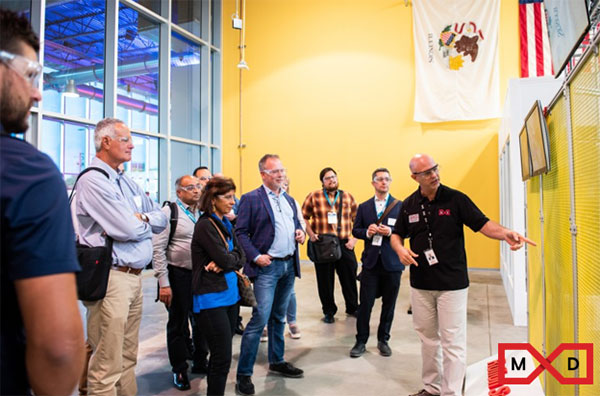Stakeholders must do more to protect, revitalize, and secure a critical component of America’s economy and national security from cyber-attacks: its manufacturing base.
By Matt Taylor
The leading developers, manufacturers, and suppliers of consumer technologies gather at the Consumer Electronics Show (CES) each year to discuss the latest innovations, such as AI, cybersecurity, and virtual reality, and how they impact and shape their business practices. At this year’s event, attendees noted a growing urgency in the U.S. to secure business operations in the face of looming cyber threats from countries and geostrategic competitors like China, Russia, and other nations.
In response, U.S. officials are increasingly prioritizing a response to this threat and scaling up our country’s cyber preparedness, with President Biden issuing a landmark executive order on improving the country’s cybersecurity shortly after taking office in 2021. Building on this action, at CES 2024, U.S. officials also announced the Cyber Trust Mark, a quality-control certification for hacking-resistant technology and a major advance for the future of our nation’s cybersecurity.
While this announcement is a key step forward in preparing for future threats, stakeholders must do more to protect, revitalize, and secure a critical component of America’s economy and national security from cyber-attacks: its manufacturing base.
From intellectual property theft to phishing threats targeting employees, manufacturers are increasingly on the front lines of the cyber wars as manufacturing emerges as the most targeted business sector for cyber-attacks. In 2022, the average cost of a ransomware attack in the U.S. topped $4.5 million, and the manufacturing sector also accounts for almost a quarter of the world’s cyber-attacks (86 percent of which are targeted rather than opportunistic).

With manufacturers driving more economic innovation than any other sector, performing more than three-quarters of all private-sector research and development in the U.S., this is a concerning development for a cornerstone of America’s economy. In addition to innovating the industries of the future, the manufacturing sector also provides 60 percent of our exports while employing over 12.5 million people nationally, creating good-paying jobs and generating needed tax revenue to fund public services in communities across the country.
The implications of these cyber-attacks on manufacturers extend beyond the economy, with manufacturing also serving as a foundational component of the defense industrial base. In the United States, 35 percent of all cyber-espionage attacks target the manufacturing sector — the vast majority targeted attacks resulting in the theft of intellectual property, which can impact our national security.
To ensure the resiliency and strength of critical infrastructure, helping the defense supply chain become more cyber secure through innovation and project initiatives is critical to advancing American interests, now and in the future.
As the National Center for Cybersecurity in Manufacturing, and a Department of Defense-sponsored manufacturing innovation institute, MxD is on the front lines of the essential challenges facing this sector, spurring collaboration with partners across the supply chain to bolster the manufacturing sector’s (and our nation’s) cybersecurity.
MxD has a portfolio of nearly 180 R&D and workforce development projects in more than 35 states with partners, members, academic researchers, startups and the federal government. These investments and projects help manufacturers adopt digital to modernize and secure their operations, improve productivity, and compete globally.
In addition to encouraging business growth through digitization, MxD also offers free resources for manufacturers to prepare and thrive for the future of cybersecurity. With multiple assessments and guides on the Cyber Marketplace, the Playbook for CMMC 2.0, and The Hiring Guide: Cybersecurity in Manufacturing, MxD is committed to helping U.S. manufacturers drive digital transformation, secure the factory environment, and prepare for current and future threats to critical infrastructure in the manufacturing ecosystem. Although digitizing can be daunting, by collaborating and embracing a culture of continuous improvement, manufacturers can enhance their cybersecurity and strengthen their supply chains while driving growth and increasing efficiency.
While developers, manufacturers, and suppliers must wait another year for the next convening at CES, concerns and themes around cyber preparedness will remain part of the broader conversation on digitization in 2024. With upcoming global elections this fall, alongside heightened geopolitical uncertainty stretching across supply chains, leaders from multiple sectors will look to mitigate the impact of “bad actors” online on their business outcomes. MxD is committed to helping them meet the moment by preparing for a stronger and more cybersecure future this year and in the years to come.

Matthew Taylor is the Vice President of Engineering and Projects at MxD. He leads the Institute’s Projects and Engineering team, which includes the Project Management Office (PMO), Cybersecurity and IT, Workforce Development, and Engineering. He also works closely with teams across MxD and its industry partners to ensure the MxD Future Factory floor delivers maximum value for members, as we collectively work to demystify new technologies and apply them to strengthen America’s manufacturers and supply chains.
Prior to joining MxD in October of 2022, his background spanned the semiconductor industry, as well as aerospace and defense – gaining hands-on experience across the entire product lifecycle. At Teradyne, Raytheon, Northrop Grumman, and ManTech International, he demonstrated a track record of success as a technical fellow, manager, and architect in several functions including digital engineering, project management, functional management, strategy, innovation management, and supply chain. Matthew holds a Master of Science in Engineering Management from Tufts University, and a Bachelor of Science in Computer Engineering from the University of Illinois, Champaign-Urbana.
Scott Ellyson, CEO of East West Manufacturing, brings decades of global manufacturing and supply chain leadership to the conversation. In this episode, he shares practical insights on scaling operations, navigating complexity, and building resilient manufacturing networks in an increasingly connected world.